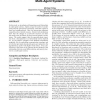Free Online Productivity Tools
i2Speak
i2Symbol
i2OCR
iTex2Img
iWeb2Print
iWeb2Shot
i2Type
iPdf2Split
iPdf2Merge
i2Bopomofo
i2Arabic
i2Style
i2Image
i2PDF
iLatex2Rtf
Sci2ools
GECCO
2006
Springer
2006
Springer
Dominance hierarchies and social diversity in multi-agent systems
In this study, we investigate self-organizing social hierarchies in multi-agent systems. Agents occupy the nodes of a smallworld network and interact exclusively with other agents in their local neighbourhood. Here, the interactions represent competition for a limited resource. Monte-Carlo simulations show that the changes in a network's structure can alter the steady-state attributes for fixed reward/penalty mechanisms. The results suggest that the expected phase transition from a homogeneous to a hierarchical society depends on: (a) the relative strengths of the feedback mechanisms employed, (b) the underlying communication topology, and (c) whether previously dominated agents are replaced in the population by agents with higher social status. A key contribution of this paper is the coherent picture painted of the relationship between social differentiation and spatial structure in a multi-agent system. Categories and Subject Descriptors I.2.11 [Artificial Intelligence]: Distri...
GECCO 2006 | Keywords Multi-agent Systems | Multi-agent Systems | Optimization | Self-organizing Social Hierarchies |
| Added | 23 Aug 2010 |
| Updated | 23 Aug 2010 |
| Type | Conference |
| Year | 2006 |
| Where | GECCO |
| Authors | Michael Kirley |
Comments (0)

